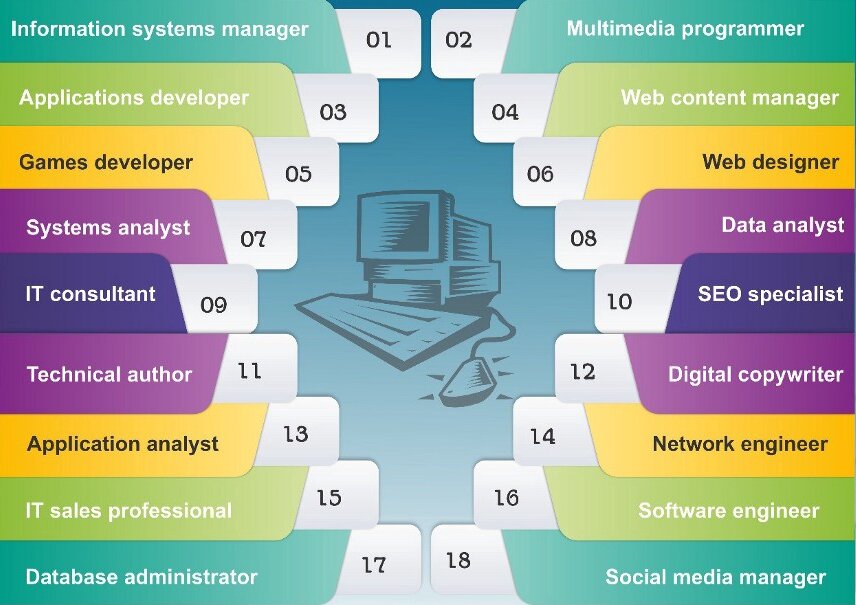Career Tips
List Of Careers In Computer Technology

Computer and technology careers are always evolving, given the rapid rate of change with technology. The key for anyone interested in pursuing a computer career is determining which area suits them best and obtaining the education and experience to find employment.
Careers in computer technology for creatives:
Here are common careers to consider if you’re interested in computers.
- 2D animator
- 3D animator
- 3D modeler
- Animation supervisor
- Animation technical director
- Animator
- Book designer
- Character designer
- Cinematic artist
- Compositor
- Concept artist
- Document imaging specialist
- Environment artist
- Flash designer
- Game artist
- Food stylist
- Game designer
- Game developer
- Game director
- Game producer
- Graphic designer
- Illustrator
- Infographic artist
- Interaction designer
- Interactive designer
- Layout artist
- Level designer
- Matte painter
- Mobile application developer
- Modeling supervisor
- Motion graphic artist
- Multimedia artist
- New media specialist
- Senior web developer
- Sign designer
- Stop motion animator
- Storyboard artist
- Texture artist
- Technical artists
- User experience designer
- User interface designer
- User interaction designer
- Video game technical artist
- Visual development artist
- Visual designer
- Web designer
Careers in computer technology:
Here are some careers in computers those with a background in computer technology could consider:
- Artificial intelligence specialist
- Bioinformatics software engineer
- Cisco Certified Internetwork Expert
- Clinical informatics director
- Computer forensics investigator
- Computer hardware engineer
- Computer science professor
- Computer support specialist
- Cybersecurity strategist
- Data architect
- Data scientist
- Data warehouse specialist
- Database analyst
- EDI systems analyst
- Electronics engineer
- Enterprise architect
- Ethical hacker
- Information architect
- Information technology consultant
- IT instructor
- IT operations analyst
- Java developer
- Lead software engineer
- Network administrator
- Network analyst
- Network architect
- Network designer
- Network engineer
- Network manager
- Nurse informaticist
- Quality assurance engineer
- Quality assurance manager
- Security administration
- Semiconductor process engineer
- Software architect
- Software developer
- Software engineer
- Software release manager
- Software tester
- Statistical programmer
- System administrator
- System analyst
- Systems architect
- Systems engineer
- Telecommunications engineer
- Telecommunication specialist
- Web developer
- Webmaster
Jobs related to computers for business majors:
These are some computer and technology careers that could be suitable for those with business majors:
- Business intelligence analyst
- eCommerce consultant
- Online media buyer
- Search engine optimization (SEO) specialist
- SEO analyst
- SEO consultant
- Web content manager
- Web editor
Computer careers that don’t require a degree:
Here is a shortlist of some professional jobs with computers that don’t need a degree:
- Professional gamer
- Website administrator
- Computer support specialist
- Help desk analyst
- IT manager
- Cybersecurity specialist
- DevOps engineer
- Computer programmer
Top 10 Computer careers
Here is a list of careers in computers that pay well:
- National average salary: $76,918 per year
- Primary duties: A web developer writes code to create websites, both at the front and back end. They use different scripting languages to build and design webpages that can work on various devices, such as phones, tablets and computers. Web developers set the technical structure for websites based on the ideas provided by graphic designers and user experience designers.
- National average salary:$77,751 per year
- Primary duties: A systems analyst, also known as a system designer or system architect, evaluates business technology to resolve issues and suggest improvements. These professionals help design and implement solutions based on a company’s or client’s needs. Computer systems analysts study databases and data processing systems to identify any problems and potential improvements. They also tend to oversee the installation of new systems and programs. Additionally, computer systems analysts may also train employees to optimize their systems once implementations are completed.
- National average salary: $86,810 per year
- Primary duties: A computer systems manager analyzes a company’s technology to decide on appropriate data systems. These professionals evaluate software, hardware, networking and other resources for development purposes. Systems managers implement all computer-related technologies, including network security, software upgrades and even internet operations. The managers also plan, direct and supervise the maintenance of computer hardware and software.
- National average salary: $87,859 per year
- Primary duties: An IT project manager coordinates the programmers and developers team’s efforts to complete projects. They analyze any technical problems and propose solutions to enhance productivity. IT project managers search for potential security breaches and take the appropriate action to protect a company’s database and software. They also assist in installing, upgrading and coordinating software changes in a company’s computer systems.
5. Information security analyst
- National average salary: $95,546 per year
- Primary duties: An information security analyst creates systems to protect information networks and websites from cyberattacks or security breaches. These analysts research data security trends to develop prevention strategies and install systems to prevent breaches before they occur. Information security analysts also monitor the performance of a company’s current information security systems and recommend security measures to protect the company.
- National average salary: $96,104 per year
- Primary duties: A computer engineer implements and maintains computer software and hardware systems. They also help design, develop and assemble any electronic circuits to maintain computerized systems. Computer engineers are responsible for installing, analyzing and upgrading software and IT systems to ensure all systems and programs are operating harmoniously. They may also help deploy, test and debug software through computer coding in different programming languages.
- National average salary: $97,880 per year
- Primary duties: A database administrator maintains and manages software databases, including client records, user accounts and libraries. These professionals ensure a company has secure access to databases and develop backup solutions to prevent data loss in the event of system failure. Database administrators also troubleshoot and diagnose any database system problems and can implement solutions to maintain the systems.
- National average salary: $105,911 per year
- Primary duties: A computer and information scientist develops technology to help solve problems in medicine, science and business. Sometimes they may also update existing hardware and software to find new approaches to solving complex problems. These scientists write algorithms that help detect and analyze patterns in large databases. Computer scientists can also create and research programs to control different robots.
- National average salary: $107,985 per year for the similar role of software engineer
- Primary duties: A software developer works creating software programs that allow users to perform specific tasks on different devices. These professionals are in charge of the entire development, testing and maintenance of software. Software developers are fluent in various computer languages and use technical creativity to solve problems. They also ensure that a program continues to function normally through software maintenance and continuous testing.
- National average salary: $122,905 per year
- Primary duties: A network architect designs, implements and maintains existing networking and data communication systems. They assess organizations’ needs for data sharing and implement solutions for local area networks and wide area networks. A computer network architect evaluates products and services available in the marketplace to make recommendations to their clients. They often complete systems tests before implementing them and resolve any problems after completing the setup.












